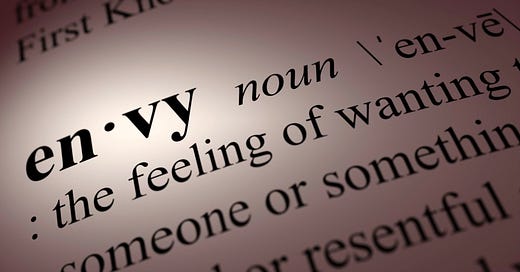In this newsletter: a cautionary tale of professional envy and how to get past it, + some travel things I’m loving right now. If you’ve found your way here but are not yet subscribed, here, let me help you with that:
Towards the end of last year, there was quite a bit of drama unfolding within the book world, and one name, in particular, floated to the top: Cait Corrain. If you haven’t heard of her, Cait Corrain is an author whose novel, Crown of Starlight, was slated to come out from Del Rey, a sci-fi and fantasy imprint under the Penguin Random House umbrella. Corrain had the sort of resources most authors only dream of—a literary agent, a major publisher, the support of a robust marketing team, and a book publicist—which made it all the more mind-boggling when she decided to “review bomb” her fellow writers.
Corrain took to GoodReads—a discoverability platform for readers to review titles, share recommendations, and connect with other book lovers—and began leaving negative reviews from a series of fake profiles she had created. She specifically targeted debut authors in her genre, many of whom were BIPOC and a few of whom were represented by her same imprint.
“I can’t believe Del Rey spent half a million dollars on this [book] when they could have spent half a million dollars on anything else. Sorry not sorry,” read one review she posted. “People should avoid this book because it’s a weak book,” read another.
Soon enough, her flurry of activity—from leaving one-star reviews to negative comments—began to get attention, culminating in a 31-page document that began circulating the internet and pulling together a digital puzzle riddled with consistencies that all pointed to one culprit: Cait Corrain.
The reckoning was swift: Corrain was dropped by her literary agent, dropped by her publisher, lost her two-book deal, Crown of Starlight was pulled from publishing schedules indefinitely, and Corrain’s reputation was decimated as the story was picked up by every major outlet. In an apology letter widely deemed insufficient and self-indulgent, Corrain blamed alcohol, drug abuse, and mental illness, writing: “It was just my fear about how my book would be received, running out of control.”
Since news of this scandal broke, I’ve thought back on this story a few times. The story of Corrain is a cautionary tale of privilege, entitlement, jealousy, and racism that seems almost fictional in its telling, as though it were pulled from the plot of Yellowface. There are many layers to this story and what presumably drove Corrain to not only target fellow writers but to destroy her own career and dash all future chances of being a published author. From her decision to review bomb authors on her own imprint to targeting BIPOC authors, you could spend hours guessing at the drivers behind Corrain’s erratic actions. But, for the sake of this newsletter, I want to pull out one aspect of this story: professional envy.
If you’ve ever felt a tinge of jealousy in the wake of spotting a social media post featuring a friend’s (or stranger’s) success, that is professional envy. That sour taste of insecurity mixed with resentment can leave people feeling bitter about an opportunity they felt was rightfully theirs. Envy, in its basic form, is a nasty—albeit common—emotion, but professional envy is a beast of a slightly different shade of green. Whereas jealousy may rest in coveting something that someone else has (a new car, a new house, a fancy vacation), professional envy is rooted in the belief that someone else’s career success has somehow robbed you of an opportunity.
I remember listening to a 2021 episode of the Emerging Form podcast (which you can subscribe to on Substack here), where the bestselling author Cheryl Strayed spoke candidly about professional envy. In the episode, Strayed discussed the idea of scarcity versus abundance and how the insecurity of scarcity can often drive professional envy. In short, we see someone celebrating a new job or creative success and think to ourselves that there isn’t enough opportunity to go around and, therefore, their success has stolen something away from us. Of course, this line of thinking isn’t rational, and yet, we can often give in to those little green demons.
I imagine that Cait Corrain succumbed to her own little green demon (amongst other deeply seeded biases worth examining) and decided that the success of her fellow authors would directly impact her own book’s trajectory. It didn’t matter that she’d had advantages and privileges that many authors do not. Nor did it seemingly matter that these authors had likewise poured their time, effort, and soul into their respective books and would be as deserving of any success. No, instead, Corrain gave in to that little green demon and acted on impulse—tearing down her fellow writers. So, what can we take away from this cautionary tale?
As Cheryl Strayed puts it: “These emotions exist; they’re incredibly common, and everyone has them, whether they admit to it or not. The question is not ‘will you have them?’ but ‘what will you do with them?”’
In my case, I’ve found two ways I try to combat professional envy. The first is turning that negative feeling into positive action. For example, if you spy someone on your LinkedIn feed who has landed a job you covet, rather than wither away in resentment, try reaching out to that person to learn about their career journey. Taking time to learn and foster a connection can bring you closer to your own goals and is a helluva lot more productive than stewing in jealousy. The other way I try to combat envy, in general, is by asking myself this simple question: would I swap lives with that person?
It goes like this: if you spot, say, an influencer sharing enviable photos of their expat life in Thailand and feel a pang of jealousy, ask yourself if you’d truly switch lives with that person indefinitely. As in, give up everything you have and love in your own life right now to step into theirs. Whether that’s a partner, your friends, a pet, living in your favorite city, whatever it is. When I combat my jealousy with that simple question, the answer is always clear: I’d never give up my friends, family, husband, and pets to step into another’s life—no matter how glamorous it may seem.
Between my last newsletter and this one, some may be wondering where is the travel content. For my paid subscribers, this travel itch was scratched with this month’s paid newsletter edition, a feminist city guide to NYC, which will be followed up by another feminist city guide in April. But, in light of my recent newsletters leaning a bit more towards life musings (what can I say, I’m feeling very thoughtful these days), I’d love to share a few travel-related things that I’m following/loving/reading now.
For a great travel read, pick up the newly published Wander Woman by an author and entrepreneur I deeply admire, Beth Santos. I had the honor of receiving an advance copy of Beth’s book and it is truly a necessity for anyone who loves to travel. For a fantastic upcoming travel event, I’d love to suggest the Latino Travel Fest, which I spoke at last year. The festival brings together the Latinx travel community for a festival that is beautifully diverse and empowering. You can use the code Unearth for 15% off any ticket. And finally, if you want to give yourself a test in resisting jealousy and ever wondered how the uber-rich travel, then this Wall Street Journal article by my dear friend Esme Benjamin will demystify that for you.
Instagram | TikTok | X (formerly Twitter) | Send me an E-mail | My Travel Memoir








